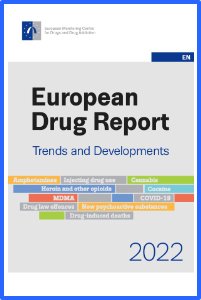European Drug Report 2022: Trends and developments
By European Monitoring Centre on Drugs and Drug Addiction (EMCDDA)
Our overall assessment is that drug availability and use remain at high levels across the European Union, although considerable differences exist between countries. Approximately 83.4 million or 29 % of adults (aged 15–64) in the European Union are estimated to have ever used an illicit drug, with more males (50.5 million) than females (33.0 million) reporting use. Cannabis remains the most widely consumed substance, with over 22 million European adults reporting its use in the last year. Stimulants are the second most commonly reported category. It is estimated that in the last year 3.5 million adults consumed cocaine, 2.6 million MDMA and 2 million amphetamines.
Around 1 million Europeans used heroin or another illicit opioid in the last year. Although the prevalence of use is lower for opioid use than for other drugs, opioids still account for the greatest share of harms attributed to illicit drug use. This is illustrated by the presence of opioids, often in combination with other substances, which was found in around three quarters of fatal overdoses reported in the European Union for 2020. It is important to note that most of those with drug problems will be using a range of substances. We are also seeing considerably more complexity in drug consumption patterns, with medicinal products, non-controlled new psychoactive substances and substances such as ketamine and GBL/GHB now associated with drug problems in some countries or among some groups. This complexity is reflected in an increasing recognition that drug use is linked with, or complicates how we respond to, a wide range of today’s most pressing health and social issues. Among these issues are mental health problems and self-harm, homelessness, youth criminality and the exploitation of vulnerable individuals and communities.
Lisbon: EMCDDA, 2022. 60p.


